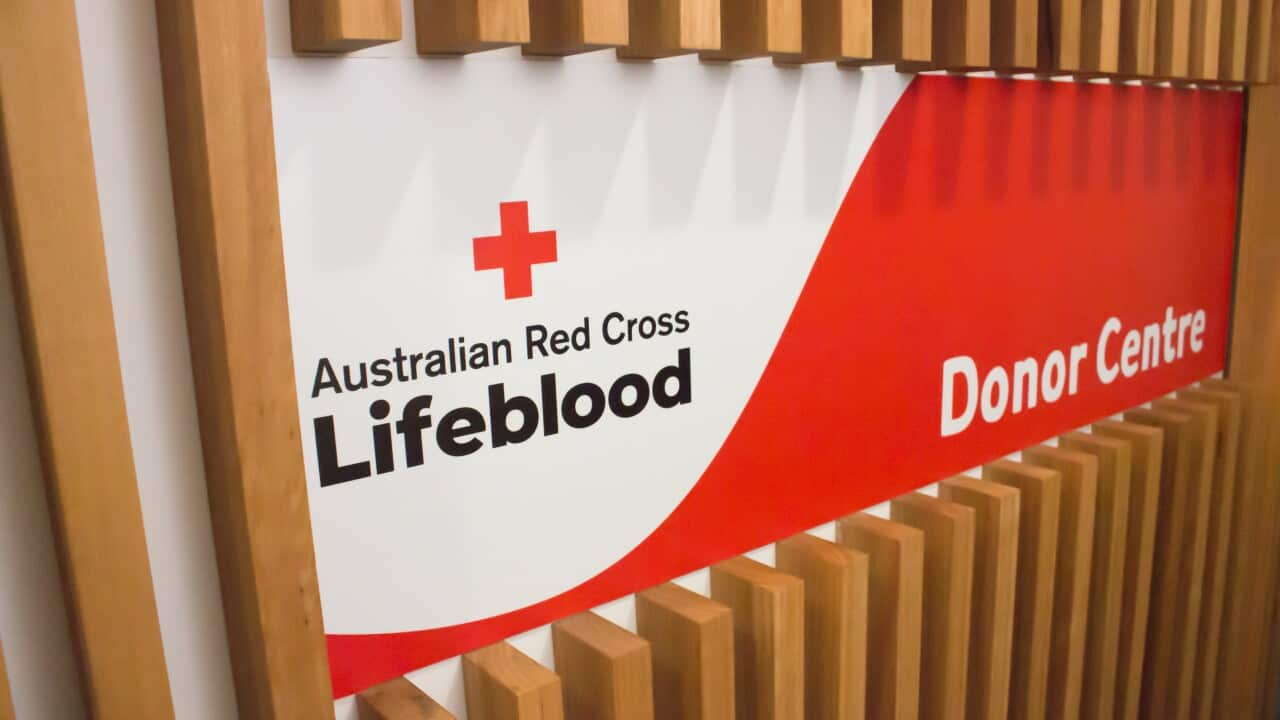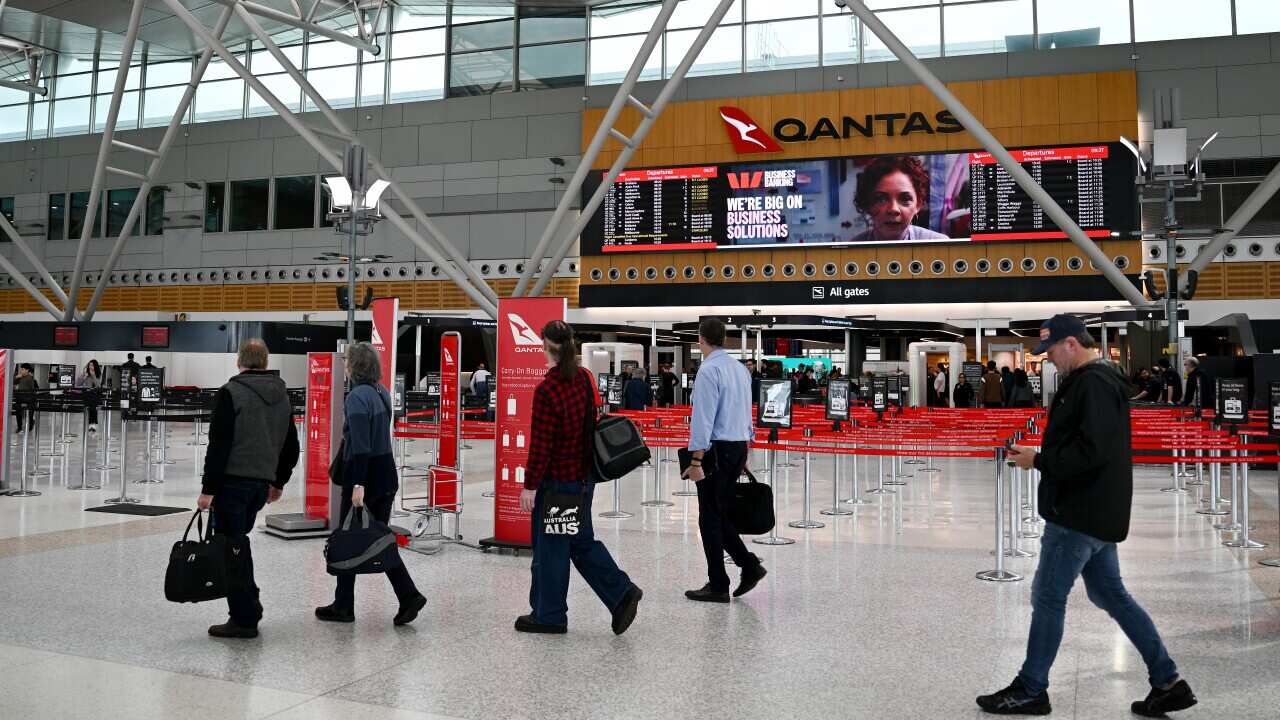Highlights
- There are three diseases in Latin America that can be transmitted through blood donations and that prevent people from that region from donating blood in Australia.
- Those restricted from donating blood in Australia are offered the option of donating plasma if they meet the requirements.
- The restrictions don't just apply to the Latin American community. People from African, Asian and North American countries must also meet strict eligibility criteria.
The story of Albany Hernández Durán, a young Venezuelan woman living in Brisbane, is an all too common one within the Latin American community in Australia.
Some time ago, motivated by the enormous gratitude she felt towards the country that she calls home today, she decided to exercise the voluntary and altruistic act of donating her blood.
But to her surprise, she was not eligible to donate, she said.
Ms Durán told SBS Spanish that she invested time and energy online researching the subject before presenting to the blood bank to make a blood donation. But just minutes after she'd rolled up up her sleeve, she was told that because she was born in Venezuela, her blood could not be used for transfusions in Australia.
"They told me that I could have Chagas disease and that I couldn't donate. They didn't explain to me clearly what other options there were. They said, that's the rule and that's it," she said.
Ms Durán said she had returned home that day feeling rejected, discriminated against and very confused.
María Fe Ríos had a similar experience to Ms Durán.
Ms Ríos, a Peruvian resident in Melbourne said she invested a lot of time in the pre-screening process and even had to reschedule her appointment on several occasions.
She told SBS Spanish that at first she was informed that because she had recently travelled to Latin America, she had to wait "a while" before she could donate blood and that she had to reschedule her appointment.
Ms Ríos said she waited some time before going back to one of the Australian Red Cross collection centres in Melbourne where, after filling out forms, she was told the same thing all over again.
She said one of the nurses, who was reviewing her form, suddenly looked at her and said: "Ah, Peru?, umm... no." At that very moment, Ms Ríos said the nurse took out a very large book containing lists of countries with various notations.
Upon finding Peru, the nurse confirmed that Ms Ríos could not donate her blood because Chagas disease is registered in her country.
Ms Río said the nurse did not explain what Chagas disease was or why the disease prevented her from donating blood in Australia.
Although both Ms Durán and Ms Ríos were left with more questions than answers after being rejected as red blood cell donors in Australia, the case of the Peruvian is much more peculiar.
She had been accompanied to the donation centre that day by her husband, who was born in Scotland but was a Peruvian citizen, from Peruvian parents, who had only lived in Scotland for the first months of his life.
When he asked if he could donate the same nurse said “yes”, despite his circumstances.
Ms Ríos was also confused as to why her blood had been rejected in Australia when she had always been an active donor in other first world countries.
Australian Red Cross has a set of strict requirements for blood donors
Although most people who are in good health are eligible to donate blood, there are specific rules in each country that restrict an individual’s ability to be a blood donor.
In Australia, the Red Cross must ensure effective safety requirements when evaluating candidates so that the collection, storage and use of blood meets the purpose for which it was donated. According to Iain Gosbell, Professor of Infectious Diseases and Microbiology at Western University School of Medicine in Sydney and National Director of Donor and Product Safety at the Australian Red Cross, people born in Latin America, including those who have recently travelled to the region, are subject to stricter eligibility criteria as these countries are included in a list with temporary deferrals or definitive restrictions on donating blood.
According to Iain Gosbell, Professor of Infectious Diseases and Microbiology at Western University School of Medicine in Sydney and National Director of Donor and Product Safety at the Australian Red Cross, people born in Latin America, including those who have recently travelled to the region, are subject to stricter eligibility criteria as these countries are included in a list with temporary deferrals or definitive restrictions on donating blood.

Donors may still be able to provide plasma. Source: Pixabay
“We have a system in place that allows us to assess people's eligibility to see if they can actually donate,” Professor Gosbell said in an interview with SBS Spanish.
Under these guidelines, citizens from Latin America and those who have recently travelled to the continent have to go through a series of slightly more specific eligibility criteria filters.
The expert also explained that the reason why there were stricter eligibility criteria in place for Latin American candidates in Australia was due to the possibility that they may carry some type of infectious condition in their blood that could prove detrimental for patients in Australia.
According to Professor Gosbell, there are three diseases in Latin America that can potentially be transmitted through blood transfusions: malaria, rabies and Chagas disease.
Thus, people who come from Argentina, Belize, Bolivia, Brazil, Chile, Colombia, Ecuador, El Salvador, French Guiana, Guatemala, Guyana, Honduras, Mexico, Nicaragua, Panama, Paraguay, Peru, Suriname, Venezuela, Uruguay cannot donate blood for transfusions in Australia.
What is Chagas disease?
According to Dr Federica Varela, a General Practitioner who works in Sydney, there are very few Australians who've heard about Chagas disease, since it is typically found in Latin America.
She explains that it is a disease that it's transmitted by the vinchuca beetle, an insect that carries the parasite that can lead to Chagas disease, and which is usually found living in Argentina, Chile and some regions of Bolivia.
According to Dr Varela, if the vector infects a young child, it may be that he or she only develops mild symptoms such as fever, swelling, cough and a headache.
However, if the infection is not detected during the early stage, it can become a chronic condition which causes abnormalities in the rhythm o dilation of the heart and even sudden death.
Professor Gosbell said that such diseases had been the reason why the Australian Red Cross has implemented restrictive measures on individuals from certain geographical regions, since the organisation’s priority is to ensure all blood transfusions are free from detectable infecting agents.
Dr Varela added that, although some people may feel discriminated against, the real reason behind these restrictions was to prevent the spread of endemic diseases among Australian patients whose lives are at risk. Professor Gosbell said that apart from Latin America, there were other geographical regions with diseases that also prevent people from donating blood. The restrictions may be temporary and may apply only after a period of travel to particular countries, or it may be permanent as in the case of people who were born and lived most of their lives in these countries.
Professor Gosbell said that apart from Latin America, there were other geographical regions with diseases that also prevent people from donating blood. The restrictions may be temporary and may apply only after a period of travel to particular countries, or it may be permanent as in the case of people who were born and lived most of their lives in these countries.

Potential blood donors are rigorously screened. Source: Keith Beaty/Toronto Star via Getty Images
Restrictions on blood donations
- Malaria: Algeria, Bangladesh, Cambodia, China, Ghana, Jamaica, Korea, Malaysia, Solomon Islands and South Africa, to name just a few.
- Ebola: Angola, Democratic Republic of Congo, Gabon, Liberia, to name just a few.
- Dengue: Bahamas, Barbados, Cook Islands, Fiji, Singapore, Taiwan, to name just a few.
- West Nile virus: Canada, United States.
Professor Gosbell said that people whose ability to donate blood was "postponed" or "deferred" were offered an opportunity to donate plasma if they met all other eligibility criteria.
People from countries on the restricted list may still be able to donate plasma
Plasma is a blood component that cannot be created synthetically and is fundamental for the creation of many treatments used for a wide range of diseases.
According to Dr Varela, the donation of plasma is as important, if not more significant, than the donation of red blood cells.
Do not think that because you are not donating blood... that your donation ceases to be valuable.
"Plasma is very valuable. I mean, in medicine we use it for a lot of things," she said.
“There are patients who need plasma donations to improve clotting and patients who are undergoing cancer treatments like chemotherapy where the immune system and the bone marrow cannot produce all these factors that we have inside plasma that are so rich in proteins, platelets and everything else. “Those are the patients that receive plasma.”
“Those are the patients that receive plasma.”

Blood plasma is very useful in treating cancer patients. Source: Pixabay
However, Ms Hernandez and many other Latin Americans, who learned about the restrictions posed by diseases like Chagas and the alternative of donating plasma on the very same day they were expecting to donate their blood, say this information should've been available online from the beginning to assist those researching how to become a blood donor.
“In the pre-screening that I did when I went to donate blood there was no mention of Chagas disease,” Ms Hernandez told SBS Spanish.
“They didn't ask me anything about Venezuela. The only question I was asked was whether I had lived in England or if I had been to England during a specific date.
“They should also explain that we can still donate plasma.”
Like her, there are many Latin Americans who claim to have wasted time and been very upset when on the day of their appointment, they were told "you can not donate blood", without any detailed explanation as to why their blood could not be accepted.
Professor Gosbell said that until there was an update of the Australian Red Cross's website people should call 13 14 95 for general enquiries and to book appointments.
"That way people can find out immediately whether or not they are able to donate blood and/or plasma", he said.









